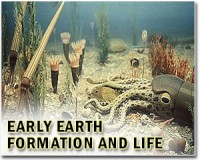| . |  |
. |
Washington DC (SPX) Apr 26, 2011 What tales they tell of their former lives, these old bones of sirenians, relatives of today's dugongs and manatees. And now, geologists have found, they tell of the waters in which they swam. While researching the evolutionary ecology of ancient sirenians--commonly known as sea cows--scientist Mark Clementz and colleagues unexpectedly stumbled across data that could change the view of climate during the Eocene Epoch, some 50 million years ago. Clementz, from the University of Wyoming, published the results in a paper in this week's issue of the journal Science. He and co-author Jacob Sewall of Kutztown University in Pennsylvania used their findings to dispute a popular scientific assumption about the temperature and composition of seawater during the time marked by the emergence of the first modern mammals. The Sirenia, named for the sirens or mermaids of Greek myth, is an order of aquatic, plant-eating mammals that live in swamps, rivers, estuaries, marine wetlands and coastal waters. Four species of "sea cows" are alive today, in two families and genera: the dugong, with one species, and manatees with three species. Sirenia also includes the Steller's sea cow, extinct since the 18th century, and others known only from fossil remains. The order evolved during the Eocene more than 50 million years ago. In their paper--"Latitudinal Gradients in Greenhouse Seawater d18O: Evidence from Eocene Sirenian Tooth Enamel"--the scientists used the isotopic composition of sirenian fossils from a broad time period and geographic area, along with climate simulation data, to add to the long-running debate over Eocene climate. "This study demonstrates the value of the fossil record, and of examining the deep time record of paleoclimatological events, so we can better understand climate change today," says Lisa Boush, program director in the National Science Foundation (NSF)'s Division of Earth Sciences, which funded the research. "This novel approach will potentially transform our way of thinking about the hydrologic response to global climate change." "I wasn't looking at it from this direction when we started the project," says Clementz, whose research is part of an NSF CAREER award. "But once we started accumulating enough samples, we could step back and get a better understanding of the habitat and dietary preferences of these fossil species, and also of the big picture. We saw that it could be reflecting climate and environmental change." A new look at climate during the Eocene, when Earth underwent a dramatic change, could help scientists better understand global climate change today. Most scientists assumed that the oxygen isotopic composition of seawater in the past was very similar to that of today, with high values at low latitudes and low values at high latitudes. Isotopes are variants of atoms of a particular chemical element, in this case oxygen, with differing numbers of neutrons. "But when we looked at the oxygen isotopic values of the fossils from low-latitude sites for the Eocene, they were much lower than we would predict," says Clementz. The finding suggests that low-latitude sites during the Eocene were much wetter than today. "This created a very different distribution in the oxygen isotopic composition of seawater for this time interval, which would, in turn, significantly impact estimates of paleoclimate and paleotemperature in the distant past," says Clementz. "Scientists have used this assumption of the oxygen isotopic values of seawater to constrain temperature estimates for the past." In their paper, Clementz and Sewall show that the assumption may be flawed, which could mean that previous estimates of water temperature are incorrect.
Share This Article With Planet Earth
Related Links National Science Foundation Explore The Early Earth at TerraDaily.com
 Study: Earth quickly managed ancient CO2
Study: Earth quickly managed ancient CO2West Lafayette, Ind. (UPI) Apr 21, 2011 Earth may be able to recover from rising carbon dioxide emissions faster than previously thought, U.S. researchers studying prehistoric climate events say. Scientists at Purdue University say when faced with high levels of atmospheric carbon dioxide and rising temperatures 56 million years ago, Earth increased its ability to pull carbon from the air. Earth and atmospheric science ... read more |
|
| The content herein, unless otherwise known to be public domain, are Copyright 1995-2010 - SpaceDaily. AFP and UPI Wire Stories are copyright Agence France-Presse and United Press International. ESA Portal Reports are copyright European Space Agency. All NASA sourced material is public domain. Additional copyrights may apply in whole or part to other bona fide parties. Advertising does not imply endorsement,agreement or approval of any opinions, statements or information provided by SpaceDaily on any Web page published or hosted by SpaceDaily. Privacy Statement |